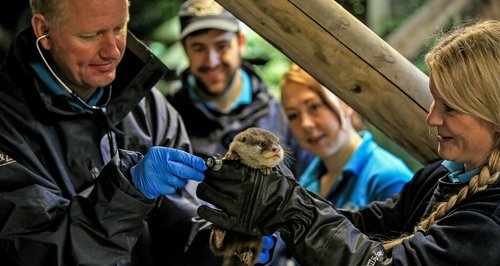On Air Now
The Capital Evening Show with Jimmy Hill 7pm - 10pm
10 May 2019, 07:16 | Updated: 10 May 2019, 07:19

Wild tulips, food security and coastal and forest habitat conservation are at the heart of the 32 new international conservation projects set to be awarded a share of £8.2 million from the UK government’s Darwin Initiative.
Recent reports on international nature have put the issue of species loss high on the nation’s agenda. Last week, the UN’s Intergovernmental Science-Policy Platform on Biodiversity and Ecosystem Services report showed nearly a million species are in danger of extinction and the Darwin Initiative is part of the UK government’s response to this emerging issue.
This latest round of funding, the twenty-fifth since the birth of the Darwin Initiative in 1992, is putting an emphasis on nature and health and providing security of food supply to rural communities in some of the most remote parts of the globe.
Environment Minister Thérèse Coffey will hear more about on-going Darwin-backed projects led by Chester Zoo when she visits and meets the team in Cheshire today (10 May).
Environment Minister Thérèse Coffey said:
"Nature matters, and the Darwin Initiative continues to support hundreds of projects that restore and enhance wildlife and nature.
"These schemes are helping nature and our wider environment, delivering clean air and water, sustainable food supplies, and recovery and resilience to natural disasters.
"That is why I am delighted to announce another £8 million of funding for these crucial projects. Our government is taking action at home and abroad to ensure we are the first generation to leave our environment in a better state than we found it."
The Darwin Initiative is a grants scheme that helps to protect nature and the natural environment around the globe.
Many of the applications reflect the UK government’s 25 Year Environment Plan commitments to protect the marine environment, to secure the benefits of biodiversity for the poorest communities, and to help prevent the extinction of species. The 25th round of funding comes during the government’s Year of Green Action, a year-long drive to help people to connect with, protect and enhance nature.
Projects supported by the Darwin Initiative are illustrative of a ‘win-win’ approach, encouraging sustainable livelihoods whilst conserving some of the world’s iconic and endangered species and landscapes, which benefits us all.
The projects set to benefit from the twenty-fifth round of funding include:
Fauna & Flora International’s project to secure the future and resilience of wild tulips and pastoral communities in the Kyrgyzstan mountains, which are vital to local community livelihoods
ZSL’s work in Nepal on a project called ‘Ghodaghodi’s Guardians: Communities restoring a Ramsar wetland at watershed scale’ to increase well-being and water security whilst protecting biodiversity
The Royal Botanic Garden Edinburgh’s project ‘Know your onions: sustainable plant use in Tajikistan’, leading to increased income, access to locally grown produce and increased capacity to cultivate produce
The World Vegetable Center’s project ‘Traditional African vegetables strengthen food and nutrition security in Madagascar’, to secure benefits of agro-biodiversity for poor farmer households
And WWT’s project ‘Enhancing wetland resilience for improved biodiversity and livelihoods in Cambodia’ will work in internationally important Lower Mekong Delta to promote sustainable livelihoods and restore wildlife habitat.
Chester Zoo
Chester Zoo has been a leading partner on five Darwin Initiative projects since 2007 and Environment Minister Thérèse Coffey will visit later today for an update on their most recent project working with Andean ‘spectacled’ bears in South America.
Speaking about Chester Zoo’s projects, Minister Coffey said:
"Chester Zoo is a leading conservation organisation and has demonstrated how to achieve successful outcomes for nature around the globe by making excellent use of the Darwin Initiative funding."
Dr Mark Pilgrim, Chief Executive Officer at Chester Zoo, said:
"One million species are at risk of extinction. But Darwin Initiative funding has been vital in helping us to tackle human wildlife conflict worldwide - working side by side with local communities, protecting bears in Bolivia, elephants in India and tigers in Nepal. Conservation projects like these are urgent and critical. Our planet depends on them."